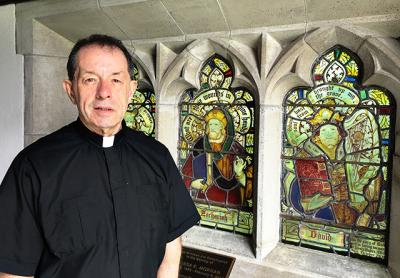The Clericus: Leaders Who Join Forces

The church and synagogue leaders who make up the East Hampton Clericus share a belief that they can more effectively serve their communities together than they would apart.
The Clericus, which meets monthly, has a tradition of community action, which comes together because of questions the members ask themselves all the time, the Very Rev. Denis C. Brunelle of St. Luke’s Episcopal Church in East Hampton said recently.
“How do we speak truth to power? How do we bring morality back into the public discussion? How do we bring the values from our various religious traditions into the public forum?” Mr. Brunelle said. “I think that’s the purpose of the Clericus. How do our particular scriptures — be it the Hebrew testament or the Christian testament — challenge us to be better than we sometimes tend to act?”
Arriving at answers is an animating principle of what the Clericus does, Cantor-Rabbi Debra Stein of the Jewish Center of the Hamptons said. The current convener of the Clericus, she has seen the group evolve since arriving here 36 years ago.
“Originally the Clericus was an organization where we as clergy came together to study together and support each other,” Ms. Stein said. “Over the years, we have been expanding further and further and filling whatever void we see in the community. And we work very closely with town officials and local leaders. If there are mouths that need to be fed, we feed them. If there are people who need shelter, we try to shel
ter them. The collaboration is important because one congregation cannot do it alone out here.”
Ms. Stein and Mr. Brunelle, the Clericus’s convener before Ms. Stein, said their congregants often express surprise at the range of issues the group takes on. “But serving the community is what we’re supposed to do; it’s our responsibility,” said the Rev. Ryan Creamer of Most Holy Trinity Catholic Church in East Hampton. “At the Clericus, we work together because it’s good to know that our communities are on the same page regarding living and coexisting together.”
The Rev. George W. Dietrich of the Hamptons Lutheran Church, which consists of St. Michael’s in Amagansett and Incarnation in Bridgehampton, said social justice was one of the most important aspects of the Clericus’s work. Earlier this year, the Lutheran church sponsored an anti-bias initiative called “Hate Has No Home Here.”
“When there’s real divisions like we so often see in society today,” Mr. Dietrich said, “it’s good to see people come together on things.”
The Clericus’s member congregations stretch from Wainscott to Montauk. It sponsors soup kitchens and supports Maureen’s Haven, which provides shelter for the homeless, among other projects. The Clericus also met with officials of the East Hampton School District not long ago, asking how its members could help after a number of suicides.
The group also has speakers at its meetings, which recently focused on the Deepwater Wind Farm and the opioid crisis.
A few years ago, the Clericus partnered with a Muslim mosque in Selden because of concern about an anti-Muslim backlash, and organized a march from Most Holy Trinity Church and the Jewish Center of the Hamptons to St. Luke’s under a banner reading, “No violence in the name of God.”
Mr. Brunelle spoke to the East Hampton Town Board not long ago about the Immigration and Customs Enforcement agency’s arrests and crackdowns on foreign-born residents here. The Clericus is frequently involved in nonpartisan political undertakings as well.
“We would never tell anyone how to vote,” Mr. Dietrich said. “But I do say, ‘Vote.’ ”
In April, the Clericus issued a statement in support of VoteHamptonNY, a voter registration and turnout drive that the Rev. Walter Silva Thompson of East Hampton’s Calvary Baptist Church spearheaded in the runup to today’s primaries and the Nov. 6 midterm elections.
The Clericus also held an Aug. 27 candidates forum, inviting incumbent Republican Representative Lee Zeldin and Perry Gershon, his Democratic challenger. Only Mr. Gershon accepted.
Mr. Brunelle noted some of the questions put to the candidate: “What were the moral values you were brought up with, and do you maintain them today or have you changed? Do you allow anyone in your life to challenge you when you stray from those values? What do you think are the moral issues confronting society today, and does your morality allow you to speak out for or against them?”
Referring to the Clericus, Rabbi Josh Franklin of the Jewish Center of the Hamptons said, “There is something really special about the collaboration that goes on here.” He noted that in Wellesley, Mass., where he worked previously, no similar interfaith group existed.
Here, the Clericus strives to present a united voice on issues and helps clergy talk to one another about their ministries.
The Rev. Denise Allen, a first-year pastor at the East Hampton Methodist Church, said it had been challenging to improve the visibility and programming of her small church, which was without even a part-time pastor for years. She said the Clericus is a terrific resource because, “I had all these great ideas, but I wasn’t sure how to enact them. Also, laypeople get what you’re doing, but they don’t know how much of your heart you put into this — this call. And who takes care of the pastor? For me, it’s been wonderful to have the Clericus and [colleagues] that understand.”
Mr. Creamer, who summered in Amagansett as a younger man and became pastor at Most Holy Trinity 15 months ago, agreed.
“East Hampton is a big town in some ways but, truth be told, it’s a small town when it comes down to knowing everybody. With the Clericus, we are able to learn from each other. And it works very well,” he said.
